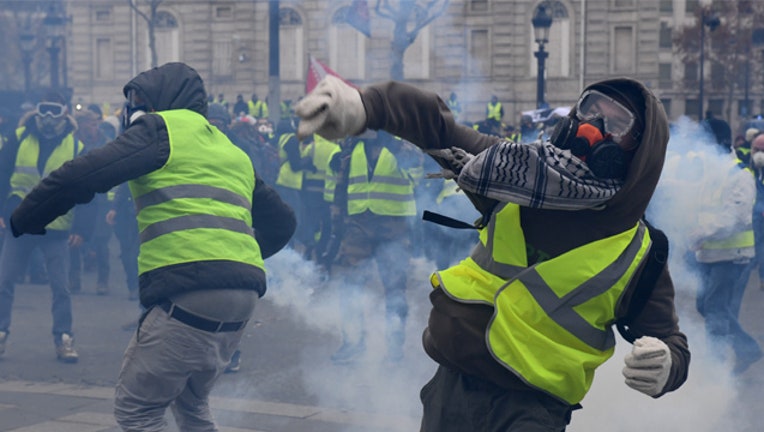Clashes as yellow vest protests grow in Belgium, Netherlands

Demonstrators throw tear gas canisters during the demonstration of the yellow vests near the Arc de Triomphe. 'Yellow Vests is a protest movement without political affiliation which was inspired by opposition to a new fuel tax. (Getty Images)
BRUSSELS (AP) - Belgian police fired tear gas and water cannons at yellow-vested protesters calling for the resignation of Prime Minister Charles Michel after they tried to breach a riot barricade, as the movement that started in France made its mark Saturday in Belgium and the Netherlands.
Protesters in Brussels threw paving stones, road signs, fireworks, flares and other objects at police blocking their entry to an area where Michel's offices, other government buildings and the parliament are located.
Brussels police spokeswoman Ilse Van de Keere said that around 400 protesters were gathered in the area.
About 100 were detained, many for carrying dangerous objects like fireworks or clothing that could be used as protection in clashes with police.
The reasons for the protests are not entirely clear. Neither Belgium nor the Netherlands has proposed a hike in fuel tax - the catalyst for the massive and destructive demonstrations in France in recent weeks.
Instead, protesters appeared to hail at least in part from a populist movement that is angry at government policy in general and what it sees as the widening gulf between mainstream politicians and the voters who put them in power. Some in Belgium appeared intent only on confronting police.
Earlier in Brussels, police used pepper spray and scuffled with a small group of protesters who tried to break through a barricade blocking access to the European Parliament and the European Union's other main institutions.
The rallies, which started at different locations around the city and converged on the European quarter, disrupted road and rail traffic on one of the busiest Christmas shopping days of the year.
Walking behind a banner reading "social winter is coming," the protesters chanted "(French President Emmanuel) Macron, Michel resign."
Dozens of people were searched as they arrived, and police warned people to stay away from the area.
Several hundred police officers were mobilized. Last week, yellow vest protesters clashed with police and torched two police vehicles in the same area. More than 70 people were detained.
In the Dutch city of Rotterdam, a few hundred protesters in the high-visibility vests that have become a symbol of the movement walked peacefully across the downtown Erasmus Bridge singing a song about the Netherlands and handing flowers to passers-by.
Sisters Beb and Ieneke Lambermont, aged 76 and 67 respectively, were among them.
"Our children are hard-working people but they have to pay taxes everywhere. You can't get housing anymore. It is not going well in Dutch society," Ieneke said. "The social welfare net we grew up with is gone," she said.
"The government is not there for the people. It is there to protect its own interests," she said.
About 100 protesters gathered in a peaceful demonstration outside the Dutch parliament in The Hague. At least two protesters were detained by police in central Amsterdam.
Jan Dijkgraaf, the editor of a Dutch "resistance newspaper" had called for peaceful protests in Amsterdam and Rotterdam.
Dijkgraaf said people are yearning for a past, more socially equitable, era of Dutch history, describing it as "a feeling of unity, but also looking after asylum-seekers well, taking good care of one another."
Other protesters appear more extreme - at a small and non-violent rally last week in The Hague one protester waved a historic Dutch flag that has become an emblem for the far right - and Dijkgraaf said some demonstrators are unhappy at his moderate plans.
But he said violence like that seen last week in France and to a lesser extent Belgium does not work in the Netherlands.
"The Netherlands is not like France - you light 100 cars on fire and you get what you want," he said in a phone interview this week. "If you torch 100 cars here you are never allowed to demonstrate again and nothing more happens."
___
Corder reported from Rotterdam. Mark Carlson in Brussels and Peter Dejong in Amsterdam contributed.

